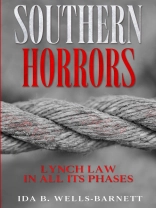During the 1890s, Ida Wells-Barnett began documenting lynching in the United States. Her findings, which were based on frequent claims that lynchings were reserved for black criminals only, were published in articles and through her pamphlet called Southern Horrors: Lynch Law in all its Phases. Wells exposed lynching as a barbaric practice of whites in the South used to intimidate and oppress African Americans who created economic and political competition-and a subsequent threat of loss of power-for whites.
While her work contains extensive documentation of lynchings, Wells-Barnett’s work is also notable for its real-time reporting on the prevalent incendiary propaganda about Black rape that was used to justify the practice.
A white mob destroyed her newspaper office and presses as her investigative reporting was carried nationally in Black-owned newspapers. Subjected to continued threats, Wells left Memphis for Chicago. She married Ferdinand L. Barnett in 1895 and had a family while continuing her work writing, speaking, and organizing for civil rights and the women’s movement for the rest of her life.
Outspoken in her beliefs as a Black female activist, Wells-Barnett faced regular public disapproval-some of which came from other leaders within the civil rights and/or women’s suffrage movements. She was active in women’s rights and the women’s suffrage movement, establishing several notable women’s organizations.
A skilled and persuasive speaker, Wells traveled nationally and internationally on lecture tours. In 2020, Wells was posthumously honored with a Pulitzer Prize special citation ’for her outstanding and courageous reporting on the horrific and vicious violence against African Americans during the era of lynching.’












